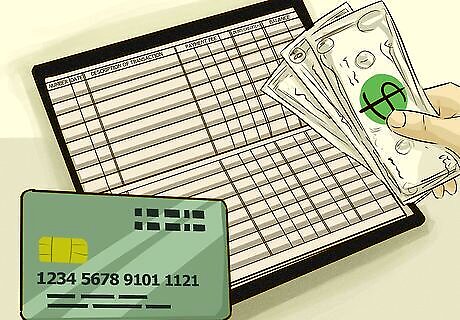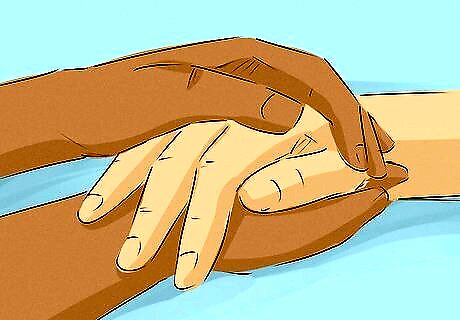
views
Taking the First Steps

Make sure it's the right decision. If you're reading this article, you've probably decided it's over. But take some time to make sure you're certain this is the right choice. You may be angry, upset over a big argument or depressed, but is the marriage salvageable? Have you talked it through with your spouse, and tried your best to make it work? Is there anything you can do to save the marriage? In the end, when you know, you know. Think about whether the following is true: Are you and your spouse already essentially living separate lives, spending little time together? Are you uninvolved in each other's daily wants and needs? Have you stopped making decisions together? Have you or your spouse turned to people outside the marriage to meet your emotional needs? If this has gone on long enough, it might be time to end it. If the relationship is abusive, and you feel your health or life is in danger, there's no question that it should end. You need to get to safety as soon as possible. Have you gotten outside help? Consider talking to a marriage counselor before making this decision. Having a third party's input can be really helpful. If nothing else, talking with a marriage counselor might help you decide for sure whether this is the right thing to do.

Think about your options. The end of a marriage usually implies divorce, but before you jump straight to making plans to divorce you might want to consider other options, like just living apart for awhile or getting a legal separation. That will give you time to live separate lives and see how it feels for your family. Being away from your spouse might make you see things a little differently. This trial period can also help you ease into changes that would otherwise seem very abrupt. You might consider staying with a friend or relative for awhile so that you can sort out your plans without worrying about the legal side of things just yet. In some cases there's no time for thinking things through. If you're in an abusive marriage, take steps to end it so you can get out right away.

Consider keeping your plan private for now. Ending a marriage changes everything between you and your spouse. In some cases, things can get very contentious. In order to protect yourself and make sure it goes the way you want it to, you might want to keep your decision to yourself while you make plans to separate your finances and set up a new living situation. You can tell a few trusted people who can help you make preparations, but don't tell someone who might share it with your spouse. This give you a chance to leave with your finances in order. If everything you own is also in your spouse's name, you'll need time to sort things out so you'll be able to start life as a single person and support yourself. Your spouse could make this very difficult. If you think the divorce could be contentious, start planning a few months before you break the news. This is especially important if you're leaving an abusive situation. Don't tell your spouse - make plans, then leave. Your spouse will find out before long.

Tell your spouse when it's time. You know best how to break the news. If you've been fighting for months, maybe it's already clear that things have come to an end, but for the sake of closure and clarity it's a good idea to have a straightforward conversation. You could arrange a quiet time at home to have the discussion, or do it in public, where the discussion might be less likely to devolve into another fight. Figure out a place and time and mark your calendar, so you know it will happen that day. If you're searching for the right words to say, you could start with "We both know this is not working out. I'm ready to end the marriage." Your spouse will either agree or be upset. In the best case scenario, you'll be able to remain friends, but a marriage's end can be very unpredictable.
Making the Separation

Assess your financial situation. If you and your spouse have joint accounts, you could be left high and dry after the divorce. Don't assume that everything will turn out completely fair. Your spouse could end up taking more than his or her share. Protect yourself by separating your money from your spouse's and doing the following: Start a separate bank account. Put in as much of your own money as possible. Don't take money from joint accounts at this time, unless it's an emergency situation. Start your own line of credit. If you don't have your own credit card, it's a good idea to start building credit history now, so you'll be able to get a loan or make a down payment on a new place.

Start saving money. If you've been relying on your spouse's income, you might need to get a job or take on a new source of income so that you can stock away money to support yourself during and after the divorce. This might mean you need to go from part time to full-time work, or take on a second job so you have another source of income. In addition to making as much money as you can, save it by doing the following: Cut back on spending. For the time being, limit your purchases to essentials. Create a budget, and stick to it. Figure out how much money you're going to need to hire an attorney, rent a new place, pay for groceries, etc.

Figure out where you're going to live. You could stay with a friend or relative in the first few weeks or months, but in time you'll need to find a permanent place to live. If you have children, finding a stable place to live is even more important. Spend some time researching affordable options. If you're on good terms with your spouse, discuss who's going to live in the home you're sharing, and who will need to leave. If you're going to be on your own, you might want to move to a brand new city to get a fresh start. Think about who you could stay with and start making plans. If you have kids, decide what size house or apartment you'll be able to afford.

Make plans for the children. If you have kids, you'll need to account for the big changes the end of your marriage will bring into their lives. Will they live in the same house? Keep going to the same school? You'll need to figure out how their living situation will change and account for smaller changes, like schedule disruptions. This is something you and your spouse should go over in detail, so that it's as easy on your children as possible. Decide when to tell them. Telling your children you're getting divorced is a big deal, and something you'll want to put thought into before you bring it up. Think about custody. Do you want full or partial custody of the children? If you want full custody, which is rare, there will need to be a good reason - like your spouse is abusive or unfit to be a parent. If this is the case, gather documentation you can use as evidence to prove it in court.

Rally emotional support. Getting over marriage is not so easy. In the coming months, while you and your spouse get divorced, you're going to need a lot of support from your friends and family. Tell the people closest to you what you're going through, and ask them for their help. Talk to friends who have been through it themselves and ask them for advice. Consider getting therapy. The divorce process can be devastating, and a therapist can give you the right tools to make it go more smoothly. Take good care of yourself. Ending a marriage is one of the toughest life experiences a person can have. You thought you were going to spend your life with this person, and now it's over. You're going to be dealing with a swirl of emotions during this period. Make sure you're eating healthy food, getting enough sleep, spending time outside, and doing whatever it is that makes you feel as good as possible.

Start living separately. Whether this means packing up your share of the belongings and moving, or saying goodbye to your spouse who's moving out, it's time to go ahead and live separately. During the divorce proceedings, things will be easier if your lives are already distinct from one another's. Figure out which belongings are yours, and which are your partners. When it comes to purchases the two of you made together, you'll need to figure out who paid for what or decide who gets it. You might choose to leave for a few days while your partner moves out, or vice versa. That way you won't risk having a fight while you're trying to pack boxes and leave.
Getting Divorced

Hire a divorce attorney. Divorces can be very complicated and difficult to navigate on one's own. Even if you don't have children or many assets, it's not something you want to do all by yourself. At the very least, you should have an attorney look over your divorce paperwork. Shop around for a divorce lawyer to find one you can afford. Look for an attorney who specializes in handling divorces. Don't select just anyone from the phone book - you'll want someone with experience. This is especially important if your spouse doesn't want to get a divorce, or if you plan to sue for grounds (such as adultery). If you don't feel you can afford an attorney, you could still hire a paralegal to help you navigate the process or review your paperwork to make sure it is filled out properly. Some states have resources for a "do it yourself" divorce. Conduct research to find out if this option is available to you.

File for divorce. The requirements and paperwork for filing for divorce differ by state. Work with your attorney to carefully fill out the proper paperwork and file it on time. In most cases, the first step will be to file a petition for divorce with your local court clerk, where your petition will receive a case number. Your spouse will be informed and will need to respond to the petition.

Participate in divorce proceedings. Depending on the specifics of your divorce, you may be able to settle it out of court with a mediator. If it's a "no contest" divorce, meaning both parties are fully on board and are on amicable terms, you might not need to go to court. If it's contested, meaning your spouse doesn't want the divorce or doesn't agree to your terms, you will likely have to go to court to have a judge rule on matters of property distribution, alimony, child custody and child support. Throughout the process, you may need to present evidence related to your financial situation. Organize your bank statements, pay stubs, receipts, and other papers so you have them ready if you need them. Your attorney should help you with every step of the process to make sure it goes smoothly. If the custody of your children is in question, there will be a separate set of paperwork to work through. Be prepared to present evidence related to your fitness as a parent. You'll need to show you have a steady income, stable living situation, and so on.

Recuperate. This will be an emotional experience for you. The divorce process itself may take many months - months that can be emotionally grueling and exhausting. After that, it will take a long time to get used to your new situation, whether or not the divorce was contentious. Lean on your friends and family for support, and get outside help from a counselor when necessary to get through this difficult time. In the end, when your marriage is really over, you can celebrate this chance for a new chapter in your life. Everyone processes divorce differently. Don't just jump into the next relationship as a way to get back at the person or to try to move forward. Instead, give yourself time to work through your emotions with counseling.

















Comments
0 comment